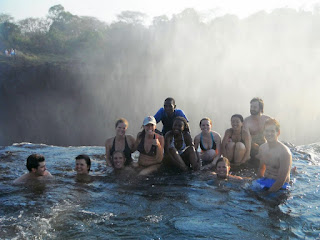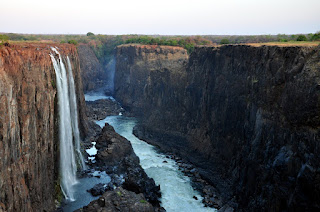When we rolled out of Lusaka on Friday en route to Livingstone, I wasn’t sure what to expect from the next three days. What followed was one of the most adventurous and fun weekends I’ve had in a long time. I hope my summaries together with the pictures will do justice to our experiences.
Arriving at our hostel Friday night, we briefly explored Livingstone’s main drag before calling it an early night. In the morning I was able to meet up with Erin, the only other Princeton in Africa Fellow in Zambia, for a delicious breakfast. It was really nice to see firsthand where she lives and works and hear more about what her fellowship experience has been like. While we reside in the same country, our lives definitely differ in a lot of ways. I’m envious of her proximity to nature, Victoria Falls and all the outdoor activites around.
After breakfast, I caught up with our group which had grown as people continued to arrive from Lusaka by bus. We set off for the falls toting our cameras, bathing suits and plenty of sunblock. We stopped off at the bridge connecting Zimbabwe and Zambia, where two of our friends zip-lined across the canyon, before arriving at the main park. Losing all track of time, and probably giving myself mild heat exhaustion, I wandered up and down the path facing the falls with my camera and tripod looking for good shots. As it is the height of dry season, the flow of the falls is a mere trickle compared to the last time I’d seen it in 2008. The water was less impressive, but it allowed us the chance to really get a look at the enormous gorge and the towering walls.
I made it back to the group just in time for our afternoon tour along the edge of the falls. 11 of us and our guide picked our way across what is typically the rushing Zambezi River, but is currently a mostly dried up rocky riverbed. We traced a path literally right along the edge of the gorge towards the ominously named Devil’s Pool. Fearlessly, we forded the remnants of the river and picked our way over stones worn smooth by flowing water. Finally, we reached our destination; a pool of water directly on the edge of the cliff.
(The group ahead of us in Devil's Pool)
The pool is formed by a uniquely shaped rock which marks the edge of the cliff and encloses some of the water from the current. On both sides, the river still rushes past and tumbles down the canyon wall. From a rocky island we jumped into this fairly small pool. We were instructed to carefully jump far enough to avoid the rocks at the near edge, but not so far as to leap over the 300 ft drop directly behind. Being in Devil’s Pool stands out as one of the most simultaneously exhilarating and terrifying moments of my life. Two feet to my left and I would have joined the rushing flow plunging to the base of the falls. Instead, we were treated to an up close perspective of the raw power of the falls and enjoyed a beautiful sunset from atop one of the wonders of the world.
The following day we white water rafted down the Zambezi. In a convoy of large yellow rafts we put into the river below the Zim/Zam bridge, just after where the falls come crashing down. Rafting the Zambezi is best in the dry season, and we came at a time when the river is at just the right height and the rapids are at their finest. Never having been rafting before, I wasn’t sure what to expect. It became apparent to me from the very first rapid how absurd this experience was going to be. We basically paddled as fast as we could into each rapid, then threw ourselves at its mercy. In the bigger rapids, there were huge drops followed by giant walls of whitewater that would smash across the raft, sweeping away anything, or anyone, that wasn’t properly secured.
On Rapid 5, known as the Stairway to Heaven (or, the Highway to Hell), we experienced our flipping fiasco. I can really only describe what transpired based on the video footage we watched at the end of the trip; everything in the moment was just water and whiteness. We crashed hard into the first wall of water in the rapid and our raft flipped easily, flinging two of us away and trapping two underneath.
We continued through the rest of the rapid in these less than ideal locations. Those under the boat fought their way out and clung on. The other “long swimmer” and I were eventually picked up by safety guides in kayaks who had followed us in. For those 15 to 30 seconds in between, though, the experience was pretty harrowing. Getting to the surface was a struggle, but even then it was difficult to catch any breath as I got hammered again and again by white walls of water. All the while I’m trying to remember how to position my body to avoid getting my feet caught in rocks or slamming into them head-on. Needless to say, I was very happy when the kayaker fought his way close enough for me to grab hold. Clambering back into the raft at the end of the rapid, out of breath and shaken, we looked around at each other with wide eyes. The Zambezi had shown us who was boss, and we continued onward with that lesson in our minds.
Minus the temporary loss of one of our shipmates to Rapid 7, we passed through the remaining rapids without any more serious incidents. In total we traveled 27 winding kilometers through 24 rapids. They ranged in size from small enough for us to intentionally swim through to one that was so dangerous we were forced to walk around it. In between rapids we admired the towering canyon walls, did a little swimming and conducted a few inter-raft raids. Exhausted, sunburned and soaked to the core at the end of the day, we were nonetheless happy and triumphant. Despite the occasional near-drowning experience, I wouldn't hesitate to go rafting again.
Monday was a holiday (Independence Day) so we didn’t have to hurry back to Lusaka. We woke up early Monday morning, had another delicious breakfast, then drove over to the Mosi o Tunya game reserve to do a short self-drive. Even in the morning the sun was strong and the heat seemed to push most of the animals into the shade and out of sight. We were lucky enough to locate one of the park guards who led us on foot to see the rhinos. The only seven white rhinos in all of Zambia are located in this park and are guarded 24/7 to protect them from poachers. We got close enough to see one of the mothers and her calf and take a few photographs before beating a hasty retreat back to the car. Having been charged a few times, our guide was happy to play it safe. Still, it was incredible to see these enormous tanks of animals in their natural habitat. Satisfied with this as a proper ending to our trip, we hit the road and made it back to Lusaka in good time. I've already started planning my next trip to Livingstone.




















